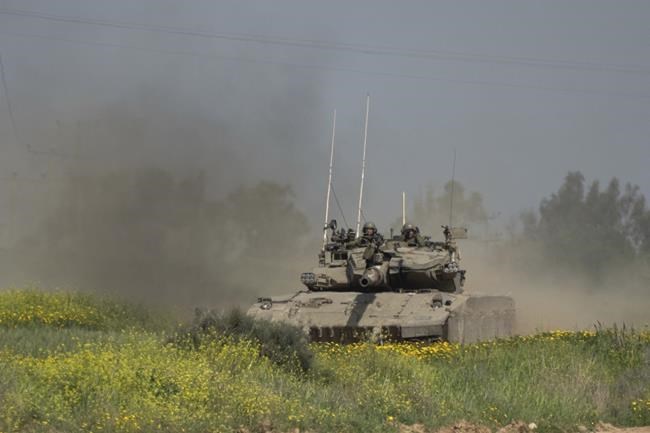OTTAWA — A senior official in Canada's foreign service says Ottawa is still sorting out the implications of the government committing to stop future military exports to Israel.
"This is being refined as we speak," Global Affairs Canada regional head Alexandre Lévêque told senators Wednesday.
Most Liberal MPs joined the NDP in backing a motion Monday calling for an end to new military permits for arms bound for Israel.
Foreign Affairs Minister Mélanie Joly says Canada already stopped approving permits for Israel in early January out of human-rights concerns.
Joly's office says the measure goes beyond "arms" to include weapon technology and equipment.
Lévêque, the Global Affairs Canada assistant deputy minister whose regions include the Middle East, told the Senate foreign affairs committee he wasn't fully sure how the motion would affect military exports.
That includes the potential impact on dual-use exports — goods that Canada regulates because they can serve both civilian and military purposes — as well as whether Israel must meet any conditions in order for arms sales to resume.
"There are things that are being refined," Lévêque said.
Ottawa's aim, he said, "is to limit any exports that could go into arms (and) weapons that could be used directly in the conflict, until we get a better sense of how the very volatile situation on the ground is evolving."
Companies can still apply for permits to export military goods, but Ottawa won't issue decisions for the time being.
Israel has a large arms industry, and receives many Canadian components that are used in products bought by countries such as Canada, Lévêque said.
"Supply chains, just like any other industry, are interdependent."
The language in the motion has caused confusion among Liberal and NDP MPs alike. Some say it amounts to an arms embargo, while others say it maintains a policy that's been in place for two months.
Global Affairs Canada said the motion does not freeze existing export permits, and doing so could hurt Canada's relationship with allies.
That's despite calls from groups like Project Ploughshares to halt exports under existing permits, arguing concerns around human rights apply equally to those shipments.
The NDP is demanding that the Liberals clarify what military goods are still being exported to Israel.
Joly's office said it has provided a parliamentary committee with copies of the permits approved for Israel since the war on Hamas started on Oct. 7, but those details have not been shared publicly.
Not all MPs agreed with the motion. Conservatives voted against it, along with three Liberals. One of them, Anthony Housefather, has said he is reconsidering his future with the party. And Niki Ashton, the lone New Democrat who abstained from the vote, refused to explain why Thursday.
Israel's envoy in Ottawa would not say whether the motion has anything more than a symbolic impact on his country, but he stressed the motion's passage was "really disturbing for many Israelis."
Israel's foreign minister has said the vote would undermine Israel's ability to defend itself, but ambassador Iddo Moed was circumspect in an interview Wednesday.
"I don't think that that's a topic I would like to discuss at the moment," Moed said.
"Either way, we are a strong country, we have a strong military, and I don't think that it's a big thing to understand that we will be able to continue to defend ourselves."
Moed stressed that Israelis remain traumatized by Hamas, a group Canada has deemed a terrorist organization.
Before the motion passed Monday, Joly told the Commons that Canada had not approved any military export permits for goods headed toward Israel since Jan. 8.
That's because of "our inability to confirm that human rights are being upheld and, of course, that our export regime requirements would be met," she said.
Asked to respond to that concern, Moed said he can't speak for how Canadian authorities assess these situations, but he argued Israel is upholding human rights.
"I don't see that the situation on the ground has significantly changed," Moed said of the January policy change.
Health officials in the Hamas-controlled Gaza Strip say nearly 32,000 have been killed in the conflict that began after the Oct. 7 attack, in which militants killed 1,200 people and took another 240 hostage.
Even before the current conflict, Canada had been trying to build trust in the region over the long term to work toward peace, Lévêque said.
"The first domino needs to fall, creating just that one little iota of confidence, confidence-building measures, that can then be reinforced by more trust," he said.
"That's the only way out of it, and not something that can happen overnight."
Lévêque said that during Joly's recent visit to the region, she looked for genuine effort on the part of Palestinian leaders to "deradicalize the elements of society that foment this hatred and this cycle of violence."
In Israel, she sought "the slight openness of the door" toward an eventual peace.
"We and many others believe that the only way to make this happen is through two states living side by side," he said.
"We're hearing from some elements in Israeli society and leadership right now that a two-state solution is no longer an option."
Lévêque said Joly has brought that up in her talks, including in Jerusalem last week.
"Simply to say Canada has developed a road map and has developed, I don't want to say expertise, but at least experience in reconciliation," he said.
"Without creating false equivalencies, that offer was put on the table as something that is uniquely Canadian that we could also bring to a future, peaceful settlement."
He made the comment when Sen. Margo Greenwood, who is Cree, asked whether any "lessons learned" about traditional governance in Canada might apply in the region.
This report by The Canadian Press was first published March 21, 2024.
— With files from Michel Saba.
Dylan Robertson, The Canadian Press



